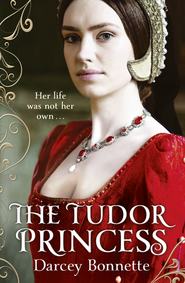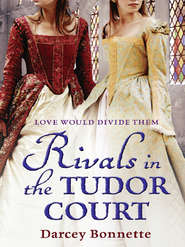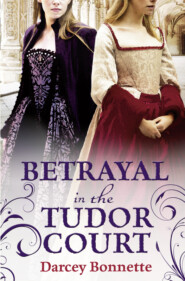По всем вопросам обращайтесь на: info@litportal.ru
(©) 2003-2025.
✖
The King’s Mistress
Настройки чтения
Размер шрифта
Высота строк
Поля
“Little Mary …?” Anne’s voice bears a gentler note. “Mary, what is it?” The mattress sinks down with her weight as she leans over me and touches my shoulder.
“My sister,” I sob. “My dear sister Catherine … she’s dead of the plague.”
At once Anne is moved to tears, gathering me in her thin arms with a fierceness that almost frightens me. She rocks back and forth with a franticness that is not soothing, but I applaud her efforts just the same.
“Damn bloody plague,” she seethes. “Why is it all so unfair? Why do we have so little control?”
It is a question that I realize has very little to do with the loss of my sister, but it doesn’t matter. I allow Anne and the other girls to soothe my tears and offer their sympathies. I soak up their embraces, wondering why it is only during tragedies that people are driven to physical demonstrations of love.
That night Madge tries to distract me from my grief by telling me stories of King Arthur.
All I can think of is my father as he imparts the news of Catherine’s death.
He did not even look up.
* * *
Because my mother has not condescended to talk to me since my arrival at court, I write her a little note and send it by messenger to her chambers.
My dearest Mother,
I am so aggrieved by my sister’s passing that the joy of court life has been sucked out of me. Filling my mind are memories of us as children, writing poems and singing songs, picking out the names of our future children. Life was simple then. Why does it all change?
All my sympathies are with you, Mother. I cannot imagine what it would be like to lose a child. I pray for you every night and hope you are finding comfort in the Lord.
Your loving daughter,
Mary
Daughter,
The Lord giveth and the Lord taketh away. We have no control over our fate. We can only press on. We are Howards.
Bless you,
Mother
Dearest little Mary,
My heart breaks for you. I know how close you and Catherine were, growing up. How well do I remember all of your childhood antics! You were such beautiful sisters. She was fair and good and sweet. I pray for her soul and for you as you grieve. Remember, my dear little love, that God is merciful and kind. His ways are mysterious and beyond our understanding. Now Catherine celebrates with the angels and knows no suffering. Her good soul is put to much better use than it could have ever been down here. May she watch over all of us.
I hope you are well and that you are making many friends at court. I hope to see you soon and that all is well between us.
With much love,
Your Bess
In the maidens’ chamber, I clutch Bess’s letter to my breast. I have read it over and over and it is stained with my tears. Bess knew us best. She loves us best. But thinking of Bess only makes me sadder, so I tuck the letter in my little silver keepsake casket along with the one from my mother, a letter I have read only once.
Mary Carey tells me she lost her husband to the sweating sickness. Many other girls come forward and confide of their losses, how one parent or sibling perished to the plague and other terrible things.
I feel less alone but the sadness remains. There is so much unresolved. If I had only been allowed to see her interred, perhaps there would be more closure. It would seem real. As it is, it’s still as though she is off in the country, married to Lord Derby.
Norfolk never mentions her name again. He does not say much of anything during my nightly reports, which consist of nothing since Anne is careful with her words. I tell him she knows why I am there.
“Of course she does—she’s not a complete idiot,” he says. “May you serve as a reminder.” He pauses. “She spends quite a bit of time with her brother George, does she not?”
I nod, smiling at the thought of her handsome brother, who is the picture perfect courtier. “He’s very fine,” I tell him.
“See to it that they aren’t alone too often,” Norfolk instructs.
“They’re not alone,” I say in confusion. “Mary Carey’s with them most of the time.”
“The court is talking,” he tells me, but I have that feeling I often get when he’s speaking; that the words are never directed at me. “Jane Parker’s jealousy is … twisted.” He refers to George Boleyn’s wife, an anxious sort of woman who seems just the sort to be “twisted,” always lurking about in doorways, or hovering just beyond a circle of friends in the hopes of attaining some juicy piece of gossip. Mary Carey warned me of her before, saying that her mind was poisoned with all manner of perverted ideas. Despite my curiosity I never pressed her for particulars. There was more than enough perversion at court without becoming preoccupied with hers.
“How?” I ask, overcome with curiosity.
“None of your concern,” Norfolk snaps. “Just see to it the three Boleyns are accompanied as often as possible.”
“But what if they don’t want me along?”
“You go with them anyway,” he says with an impatient wave of his hand. “Children are annoying creatures, immune to subtlety.” He leans forward and meets my eyes. “In other words, Mary: be yourself.”
I am struck as dumb as he thinks I am. At once every condescending word and derisive jibe he ever directed toward me is brought to mind, constricting my heart as though it were clutched in his perfect fist. Tears burn my eyes, but it would humiliate me further to let them fall in front of him. I must hide them from him, as I always do. I draw in a breath. This talk of siblings brings Catherine to mind, and an image of my brother Henry soon follows.
“Are we to see Henry soon, Father?”
“Henry who?”
I can’t fault him for this. Everyone is named Henry.
“Howard—Surrey, of course!” I say with a giggle, wondering if there is anything under God’s sun I can do to make this man smile.
“Oh, him.” He rifles through more documents. “Your brother’s at Windsor Palace keeping company with Henry Fitzroy, King Henry’s boy.” His eyes grow distant. “Fitzroy … His mother was a clever one. To think of all little Bessie Blount became … mistress of a monarch, the mother of the king’s son, a son showered with grand titles.” He offers a slight laugh. “But not quite grand enough. No, Bessie Blount went as far as she could go with what she had. But our Anne shall go even farther. No bastard children for her …”
I am only half listening. In truth I could not care less about King Henry’s boy or fair Bessie Blount at this point. My heart surges with hope as I anticipate a visit with my beloved brother.
“Can we go to him?” I ask. “Please?”
He pauses. My heart races. Surely this means he is considering. “I’m sure he’ll be at the next court function. Off with you now. Remember what I told you.”
“Yes, my lord,” I say in disgruntled tones as I quit the room. My heart aches for something familiar. I long for my brother’s laugh— he could make light of anything with his jokes and easy nature. I long for my sister, forever lost to me. She, with her perfect grasp on a world I do not seem to belong to, would know how to advise me. In her I could confide of my awkwardness, my fear, and my desire to be the lady she was with such effortlessness.
I long for the mother I never had, a woman so lost in her own pain that it has ruined her for any of her children.
I long for Bess, for her reassurance, her ample bosom to snuggle in, her simple, uncomplicated company.
When I return to the maidens’ chamber I remove her letter from the little casket.








